Xuelong Dai
Don't believe everything you read: Understanding and Measuring MCP Behavior under Misleading Tool Descriptions
Feb 03, 2026Abstract:The Model Context Protocol (MCP) enables large language models to invoke external tools through natural-language descriptions, forming the foundation of many AI agent applications. However, MCP does not enforce consistency between documented tool behavior and actual code execution, even though MCP Servers often run with broad system privileges. This gap introduces a largely unexplored security risk. We study how mismatches between externally presented tool descriptions and underlying implementations systematically shape the mental models and decision-making behavior of intelligent agents. Specifically, we present the first large-scale study of description-code inconsistency in the MCP ecosystem. We design an automated static analysis framework and apply it to 10,240 real-world MCP Servers across 36 categories. Our results show that while most servers are highly consistent, approximately 13% exhibit substantial mismatches that can enable undocumented privileged operations, hidden state mutations, or unauthorized financial actions. We further observe systematic differences across application categories, popularity levels, and MCP marketplaces. Our findings demonstrate that description-code inconsistency is a concrete and prevalent attack surface in MCP-based AI agents, and motivate the need for systematic auditing and stronger transparency guarantees in future agent ecosystems.
Improving Transferable Targeted Attacks with Feature Tuning Mixup
Nov 23, 2024



Abstract:Deep neural networks exhibit vulnerability to adversarial examples that can transfer across different models. A particularly challenging problem is developing transferable targeted attacks that can mislead models into predicting specific target classes. While various methods have been proposed to enhance attack transferability, they often incur substantial computational costs while yielding limited improvements. Recent clean feature mixup methods use random clean features to perturb the feature space but lack optimization for disrupting adversarial examples, overlooking the advantages of attack-specific perturbations. In this paper, we propose Feature Tuning Mixup (FTM), a novel method that enhances targeted attack transferability by combining both random and optimized noises in the feature space. FTM introduces learnable feature perturbations and employs an efficient stochastic update strategy for optimization. These learnable perturbations facilitate the generation of more robust adversarial examples with improved transferability. We further demonstrate that attack performance can be enhanced through an ensemble of multiple FTM-perturbed surrogate models. Extensive experiments on the ImageNet-compatible dataset across various models demonstrate that our method achieves significant improvements over state-of-the-art methods while maintaining low computational cost.
Transferable 3D Adversarial Shape Completion using Diffusion Models
Jul 14, 2024
Abstract:Recent studies that incorporate geometric features and transformers into 3D point cloud feature learning have significantly improved the performance of 3D deep-learning models. However, their robustness against adversarial attacks has not been thoroughly explored. Existing attack methods primarily focus on white-box scenarios and struggle to transfer to recently proposed 3D deep-learning models. Even worse, these attacks introduce perturbations to 3D coordinates, generating unrealistic adversarial examples and resulting in poor performance against 3D adversarial defenses. In this paper, we generate high-quality adversarial point clouds using diffusion models. By using partial points as prior knowledge, we generate realistic adversarial examples through shape completion with adversarial guidance. The proposed adversarial shape completion allows for a more reliable generation of adversarial point clouds. To enhance attack transferability, we delve into the characteristics of 3D point clouds and employ model uncertainty for better inference of model classification through random down-sampling of point clouds. We adopt ensemble adversarial guidance for improved transferability across different network architectures. To maintain the generation quality, we limit our adversarial guidance solely to the critical points of the point clouds by calculating saliency scores. Extensive experiments demonstrate that our proposed attacks outperform state-of-the-art adversarial attack methods against both black-box models and defenses. Our black-box attack establishes a new baseline for evaluating the robustness of various 3D point cloud classification models.
AdvDiff: Generating Unrestricted Adversarial Examples using Diffusion Models
Jul 24, 2023Abstract:Unrestricted adversarial attacks present a serious threat to deep learning models and adversarial defense techniques. They pose severe security problems for deep learning applications because they can effectively bypass defense mechanisms. However, previous attack methods often utilize Generative Adversarial Networks (GANs), which are not theoretically provable and thus generate unrealistic examples by incorporating adversarial objectives, especially for large-scale datasets like ImageNet. In this paper, we propose a new method, called AdvDiff, to generate unrestricted adversarial examples with diffusion models. We design two novel adversarial guidance techniques to conduct adversarial sampling in the reverse generation process of diffusion models. These two techniques are effective and stable to generate high-quality, realistic adversarial examples by integrating gradients of the target classifier interpretably. Experimental results on MNIST and ImageNet datasets demonstrate that AdvDiff is effective to generate unrestricted adversarial examples, which outperforms GAN-based methods in terms of attack performance and generation quality.
Generating Unrestricted 3D Adversarial Point Clouds
Nov 19, 2021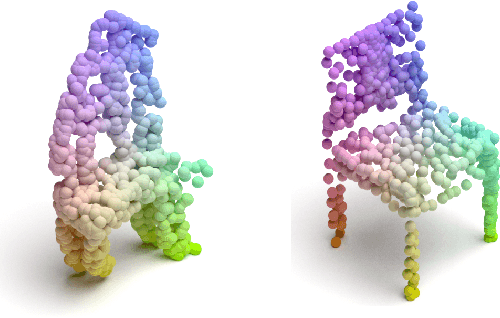

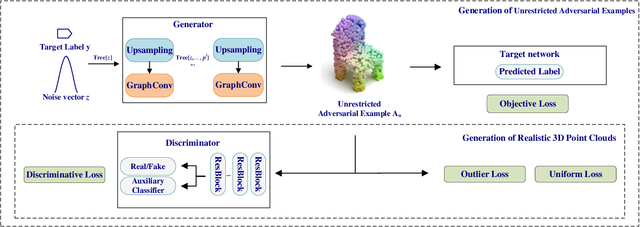

Abstract:Utilizing 3D point cloud data has become an urgent need for the deployment of artificial intelligence in many areas like facial recognition and self-driving. However, deep learning for 3D point clouds is still vulnerable to adversarial attacks, e.g., iterative attacks, point transformation attacks, and generative attacks. These attacks need to restrict perturbations of adversarial examples within a strict bound, leading to the unrealistic adversarial 3D point clouds. In this paper, we propose an Adversarial Graph-Convolutional Generative Adversarial Network (AdvGCGAN) to generate visually realistic adversarial 3D point clouds from scratch. Specifically, we use a graph convolutional generator and a discriminator with an auxiliary classifier to generate realistic point clouds, which learn the latent distribution from the real 3D data. The unrestricted adversarial attack loss is incorporated in the special adversarial training of GAN, which enables the generator to generate the adversarial examples to spoof the target network. Compared with the existing state-of-art attack methods, the experiment results demonstrate the effectiveness of our unrestricted adversarial attack methods with a higher attack success rate and visual quality. Additionally, the proposed AdvGCGAN can achieve better performance against defense models and better transferability than existing attack methods with strong camouflage.
Long-term Cross Adversarial Training: A Robust Meta-learning Method for Few-shot Classification Tasks
Jul 01, 2021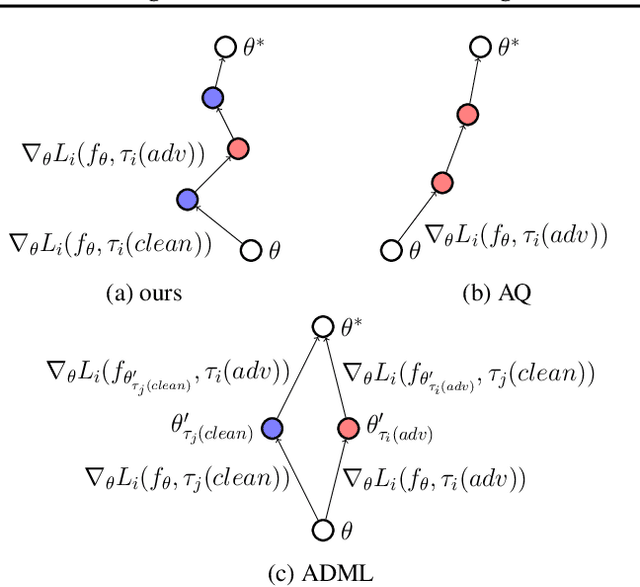

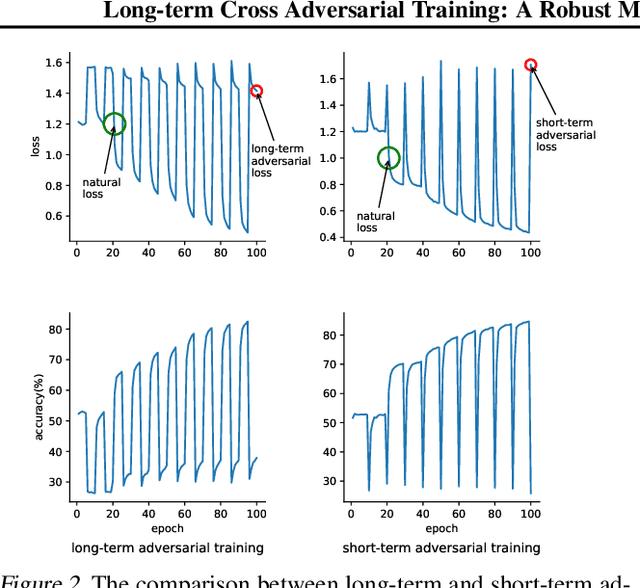
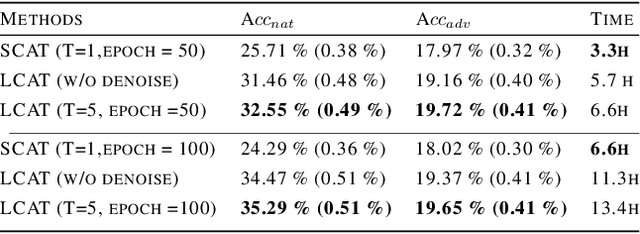
Abstract:Meta-learning model can quickly adapt to new tasks using few-shot labeled data. However, despite achieving good generalization on few-shot classification tasks, it is still challenging to improve the adversarial robustness of the meta-learning model in few-shot learning. Although adversarial training (AT) methods such as Adversarial Query (AQ) can improve the adversarially robust performance of meta-learning models, AT is still computationally expensive training. On the other hand, meta-learning models trained with AT will drop significant accuracy on the original clean images. This paper proposed a meta-learning method on the adversarially robust neural network called Long-term Cross Adversarial Training (LCAT). LCAT will update meta-learning model parameters cross along the natural and adversarial sample distribution direction with long-term to improve both adversarial and clean few-shot classification accuracy. Due to cross-adversarial training, LCAT only needs half of the adversarial training epoch than AQ, resulting in a low adversarial training computation. Experiment results show that LCAT achieves superior performance both on the clean and adversarial few-shot classification accuracy than SOTA adversarial training methods for meta-learning models.
 Add to Chrome
Add to Chrome Add to Firefox
Add to Firefox Add to Edge
Add to Edge